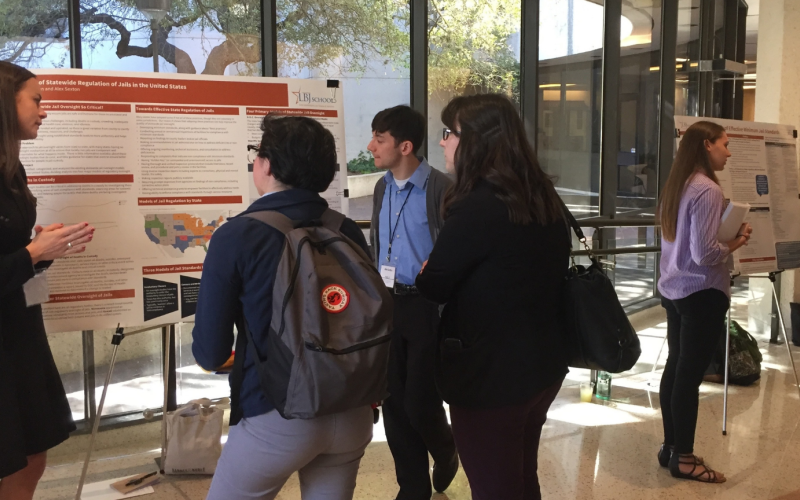Information for Students
We have a school of public affairs [to] produce thinkers and doers: people who dream of progress and will try to turn those dreams into solid achievements." — President Lyndon Baines Johnson
Our impact is magnified by our team of students, who contribute their skills in policy and legal analysis and their passion for social change.
Student Work

PJIL creates opportunities for graduate students in public policy and law to be involved in real-world justice policy projects, getting them excited, inspired, and prepared for their future careers by working closely with policy makers, agency officials, advocates, and individuals impacted by the justice system. Students have produced reports, briefs, and other documents that have influenced policy reform and systems change efforts, and increased public awareness about important justice policy issues.
Opportunities for Graduate Students
Student Research Assistants
Graduate-level policy and law students can support our efforts by applying to be a student research assistant. Student research assistants will have the opportunity to participate in collaborative research on PJIL’s project portfolio, and will focus on different activities, depending upon their background, interest, and PJIL’s needs. Student research assistants have a strong background in and commitment to justice reform, and typically will have already taken one of PJIL’s affiliated courses. These are paid positions that are filled before the fall, winter, and summer semesters.
Student Volunteers
PJIL may have occasional need for volunteers to assist with events or specific short-term projects or tasks. Students can sign-up to volunteer with PJIL using the form below. Please specify if you have certain interests or skills, and we will reach out to you if we need any volunteer assistance.
PJIL Affiliated Courses
Criminal Justice Policy: Corrections and Sentencing
This seminar provides an overview of mass incarceration in the United States, and includes a focus on issues related to racial justice, sentencing, pretrial practices, prison conditions, COVID in prisons and jails, independent oversight, and international models of corrections. Students can conduct in-depth research on a topic of their choosing. When conditions permit, we include tours of prisons and jails, and during the legislative session in Texas, we also observe legislative committee hearings.
Youth Justice and the Policy Development Process
This course examines the policy development process through the lens of youth justice. Using four case studies related to school-to-prison pipeline issues, decarceration of juvenile facilities, extreme sentencing of youth, and the raise-the-age campaign, students learn about the various factors that influence policy development. The course involves role-play activities in which students testify before mock legislative committees and serve as mock legislators, and produce policy memos and written witness testimony. There is also a substantial team research project.
Advanced Research in Criminal Justice
This course involves intensive team research projects focused on various aspects of the incarceration experience, with an eye towards producing research and policy documents that can help inform policy and practice. The specific research topic varies each year. Although this is considered an “advanced” class, there is no prerequisite for the course. However, students should be prepared to engage in substantial research and writing, and should be comfortable working in teams on a significant project. While a background in criminal justice or corrections is not required for the class, it would certainly be helpful.
Prisons and the Environment
This course examines the range of environmental risks in the carceral setting by focusing on specific case studies of environmental harm suffered by incarcerated people in several instances over the last ten years. Students will hear directly from people who have been incarcerated who can speak to the impact of these environmental hazards. The course will examine some of the practical challenges that arise when it comes to addressing these environmental risks, such as the politics of funding infrastructure improvements, the complexities of the policy development process, and the difficulties of mass evacuations. Students will study the laws and policies in place to protect incarcerated people from environmental impacts, and the gaps in protection that exist. The course will also delve into the legal obstacles people in custody face when they seek redress for the environmental harms they have suffered.